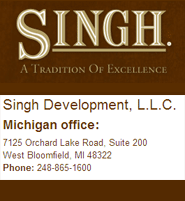|
|
|
|
|
|
Las Vegas is the most populous city in the state of Nevada, the seat of Clark County, and an internationally renowned major resort city for the gaming industry, shopping, and entertainment. Las Vegas, billed as The Entertainment Capital of the World, is famous for the number of large casino resorts and their associated entertainment. The city's tolerance for various forms of adult entertainment earned it the title of Sin City, and this image has made Las Vegas a popular setting for films and television programs. Outdoor lighting displays are everywhere on the Las Vegas Strip and are seen elsewhere in the city as well; as seen from space, Las Vegas is the brightest city on earth.
Established in 1905, Las Vegas officially became a city in 1911. With the growth that followed, at the close of the century Las Vegas was the most populous American city founded in the 20th century (a distinction held by Chicago in the 19th century). It was the 28th most populous city in the United States during the 2000 census. The population of the city was estimated at 552,539 and the Las Vegas metropolitan area exceeds 2.0 million residents.
The name Las Vegas is often applied to the unincorporated areas of Clark County that surround the city, especially the resort areas on and near the Las Vegas Strip. This 4.5-mile (7.2-km) stretch of Las Vegas Boulevard is mostly outside the city limits, in the unincorporated towns of Paradise and Winchester.
Las Vegas was named by Spaniards in the Antonio Armijo party, who used the water in the area while heading north and west along the Old Spanish Trail from Texas. In the 1800s, areas of the Las Vegas Valley contained artesian wells that supported extensive green areas or meadows (vegas in Spanish), hence the name Las Vegas.
John C. Frémont traveled into the Las Vegas Valley on May 3, 1844, while it was still part of Mexico. He was a leader of a group of scientists, scouts and observers for the United States Army Corps of Engineers. On May 10, 1855, following annexation by the United States, Brigham Young assigned 30 missionaries of The Church of Jesus Christ of Latter-day Saints led by William Bringhurst to the area to convert the Paiute Indian population to Mormonism. A fort was built near the current downtown area, serving as a stopover for travelers along the "Mormon Corridor" between Salt Lake and the briefly thriving colony of "saints" at San Bernardino, California. However, Mormons abandoned Las Vegas in 1857. Las Vegas was established as a railroad town on May 15, 1905, when 110 acres (44.5 ha) owned by Montana Senator William A. Clark's San Pedro, Los Angeles and Salt Lake Railroad, was auctioned off in what is now downtown Las Vegas. Las Vegas was part of Lincoln County until 1909 when it became part of the newly established Clark County. The St. Joan of Arc Catholic Church near 4th and Bridger in downtown was founded in 1910.Las Vegas became an incorporated city on March 16, 1911.
The major attractions in Las Vegas are the casinos. The most famous hotels are located on Las Vegas Boulevard, better known as the Las Vegas Strip. Many of these hotels carry thousands of rooms. There are, of course, large casino areas in these hotels as well. There are many hotel casinos in the city's downtown area as well, which was the original focal point of the city's gaming industry in its early days. Several large hotels and casinos are also located somewhat off the Strip but adjacent to it, as well as in the county around the city.
In recent years, Las Vegas has been a popular destination for Hawaiians. In 2002, almost 80,000 former residents of Hawaii lived in Las Vegas, and nearly 3,000 Hawaiians visited Las Vegas every week. Las Vegas is sometimes referred to as Hawaii's Ninth Island.[14] The city is the home to the first ABC Stores branch outside the state of Hawaii.
Las Vegas has one of the highest suicide and divorce rates of the U.S. The city's high divorce rate is partly due to the fact that divorce is easier in Nevada than most other states. The city was also ranked by Forbes as having the highest Income disparity in the nation.
City Ride Bus Service is provided by the Transportation Services Division. This limited service offers two routes in the downtown area with fare running from free to $0.50 depending on age and disabilities.
CAT Bus is a popular means of public transportation among locals and tourists with various bus routes covering a large portion of the valley. The CAT system carries approximately 175,000 people per weekday, or about 10 percent of the valley's population.
The Las Vegas Monorail runs from the MGM Grand Hotel at the south end of the Strip to the Sahara Hotel and Casino at the north end of the Strip.
The street numbering system is divided by the following streets:
* Westcliff Drive, US 95 Expressway, Fremont Street and Charleston Boulevard divide the north-south block numbers from west to east.
* Las Vegas Boulevard divides the east-west streets from the Las Vegas Strip to near the Stratosphere, then Main Street becomes the dividing line from the Stratosphere to the North Las Vegas border, after which the Goldfield Street alignment officially divides east and west.
* On the east side of Las Vegas, block numbers between Charleston Boulevard and Washington Avenue are different along Nellis Boulevard, which is the eastern border of the city limits.
McCarran International Airport provides commercial flights into the Las Vegas valley. The airport also serves private aircraft, domestic and international passenger flights, and freight/cargo flights. General aviation traffic generally uses North Las Vegas Airport, other airfields are available.
Intercity bus service to Las Vegas is provided by traditional intercity bus carriers, including Greyhound; many charter services, including Green Tortoise; and several Chinatown bus lines. Amtrak California also operates Deluxe Express Thruway Motorcoach dedicated service between the City and its nearest passenger rail station in Barstow, California.
The Union Pacific Railroad is the only class one railroad to provide rail freight service to the city.
Until 1997, the Amtrak Desert Wind train service ran through Las Vegas using the Union Pacific Railroad (UP) rails that run through the city; Amtrak service to Las Vegas has since been replaced by Amtrak's Thruway Motorcoach bus service. Plans to restore Los Angeles to Las Vegas Amtrak service using a Talgo train have been discussed but no plan for a replacement has been implemented. The Las Vegas Amtrak station was located in the Plaza Hotel. It had the distinction of being the only train station located in a casino.
Some groups have proposed the California-Nevada Interstate Maglev line from Las Vegas to Los Angeles in order to ease the incoming and outgoing traffic congestion on I-15. Another proposal, the Desert Xpress, would involve the privately-financed construction of a train from Victorville, California, to Las Vegas, using off-the-shelf high speed rail technology.
Two major freeways - Interstate 15 and Interstate 515/U.S. Route 95 - cross in downtown Las Vegas. I-15 connects Las Vegas to Los Angeles and San Diego, California, and heads northeast to and beyond Salt Lake City, Utah. I-515 goes southeast to Henderson, beyond which US 93 continues over the Hoover Dam towards Phoenix, Arizona. US 95 connects the city to northwestern Nevada, including Carson City and Reno. US 93 splits from I-15 northeast of Las Vegas and goes north through the eastern part of the state, serving Ely and Wells, and US 95 heads south from US 93 near Henderson through far eastern California. A three-quarters beltway has been built, consisting of Interstate 215 on the south and Clark County 215 on the west and north. Other radial routes include Blue Diamond Road (SR 160) to Pahrump and Lake Mead Boulevard (SR 147) to Lake Mead.
|
|
|




|
|
|
|
|